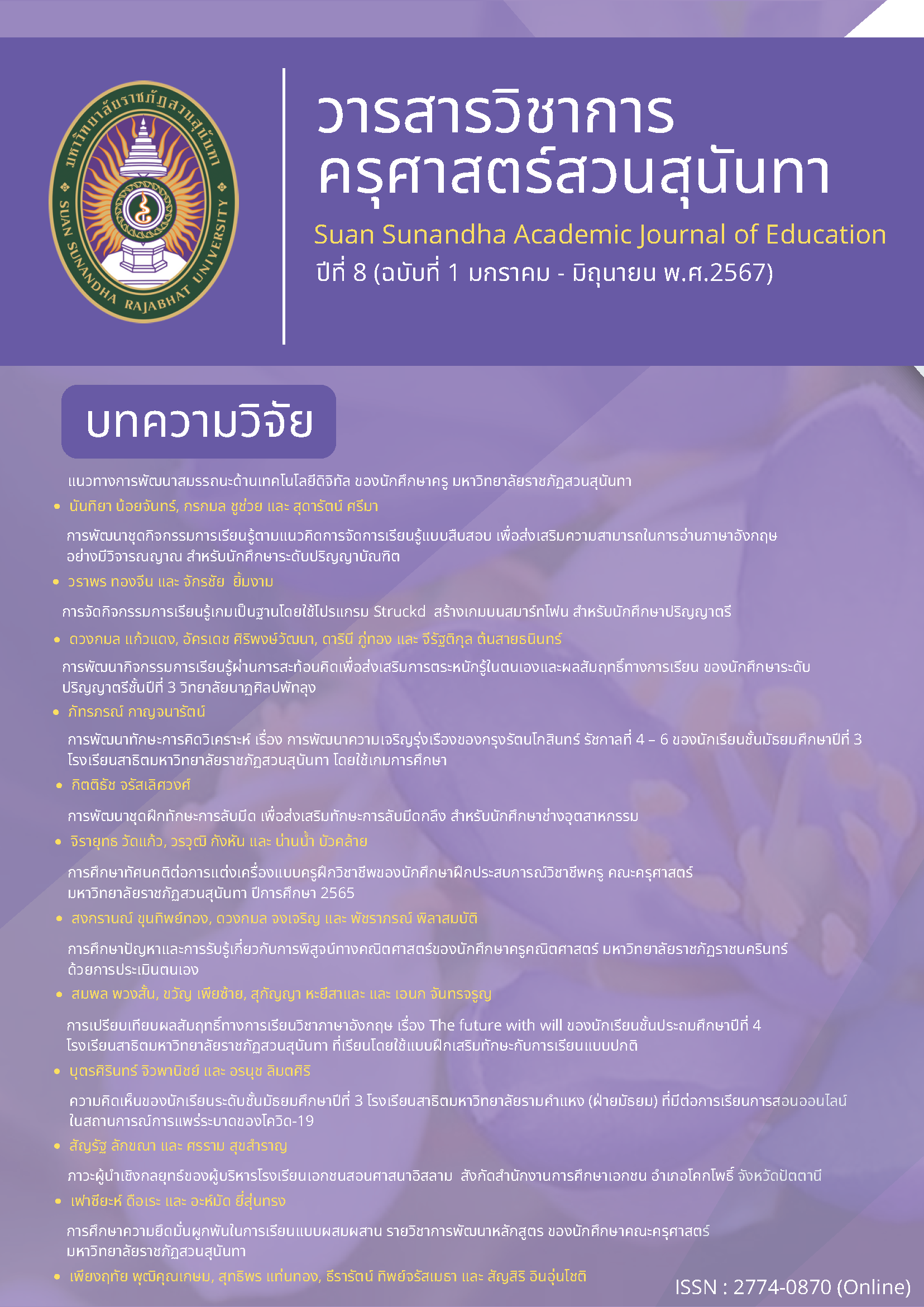การจัดกิจกรรมการเรียนรู้เกมเป็นฐานโดยใช้โปรแกรม Struckd สร้างเกมบนสมาร์ทโฟน สำหรับนักศึกษาปริญญาตรี
คำสำคัญ:
การจัดกิจกรรมการเรียนรู้, เกมบนสมาร์ทโฟน, โปรแกรม Struckdบทคัดย่อ
งานวิจัยเชิงทดลองนี้มีวัตถุประสงค์เพื่อ 1) เปรียบเทียบผลสัมฤทธิ์ทางการเรียนของนักศึกษาก่อนและหลังเรียนโดยใช้โปรแกรม Struckd สร้างเกมบนสมาร์ทโฟน 2) ศึกษาความพึงพอใจของนักศึกษาที่มีต่อการจัดกิจกรรมการเรียนรู้ โดยใช้โปรแกรม Struckd สร้างเกมบนสมาร์ทโฟน ประชากร คือ นักศึกษาระดับปริญญาตรี ชั้นปีที่ 3 ภาคเรียนที่ 2/2565 คณะศึกษาศาสตร์ มหาวิทยาลัยนอร์ทกรุงเทพ จำนวน 205 คน กลุ่มตัวอย่าง คือ นักศึกษาระดับชั้นปีที่ 3 สาขาการศึกษาปฐมวัย คณะศึกษาศาสตร์ มหาวิทยาลัยนอร์ทกรุงเทพ จำนวน 25 คน ได้มาจากการเลือกแบบเจาะจง เครื่องมือที่ใช้ในการวิจัย ประกอบด้วย 1) แบบทดสอบวัดผลสัมฤทธิ์ทางการเรียนของนักศึกษา แบบปรนัย 4 ตัวเลือก จำนวน 30 ข้อ 2) แบบสอบถามความพึงพอใจที่มีต่อการจัดกิจกรรมการเรียนรู้โดยใช้โปรแกรม Struckd สร้างเกมบนสมาร์ทโฟนสถิติที่ใช้ในงานวิจัย ประกอบด้วย ค่าเฉลี่ย ส่วนเบี่ยงเบนมาตรฐาน สถิติทดสอบค่าที (t-test dependent) ผลการวิจัย พบว่า 1) ผลสัมฤทธิ์ทางการเรียนของนักศึกษาโดยใช้โปรแกรม Struckd สร้างเกมบนสมาร์ทโฟน พบว่าหลังเรียนสูงกว่าก่อนเรียนอย่างมีนัยสําคัญทางสถิติที่ระดับ .05 2) ผลความพึงพอใจของนักศึกษามหาวิทยาลัยนอร์ท กรุงเทพ ที่มีต่อการจัดกิจกรรมการเรียนรู้โดยใช้โปรแกรม Struckd สร้างเกมบนสมาร์ทโฟน โดยแบบประเมินความพึงพอใจผ่านการประเมินจากผู้เชี่ยวชาญ ซึ่งมีค่า IOC อยู่ระหว่าง 0.67 – 1.00 และ แบบสอบถามมีความเชื่อมั่นมากกว่า 0.7 โดยภาพรวมอยู่ ในระดับมากที่สุด
เอกสารอ้างอิง
ชนัตถ์ พูนเดช.,และธนิตา เลิศพรกุลรัตน์, (2559). แนวทางการจัดการเรียนรู้ด้วยแนวคิดเกมมิฟิเคชัน. Journal of Education and Innovation, 18(3), 331–339. Retrieved from https://so06.tci-thaijo.org/index.php/edujournal_nu/article/view/66651
พรชุลี ลังกา. (2564). ผลของการจัดการเรียนรู้แบบเกมเป็นฐานที่มีต่อผลสัมฤทธิ์ทางการเรียนของนักศึกษารายวิชาการศึกษาปฐมวัย. วารสารวิจัยทางการศึกษา, 16(1), 112-123.
พิมพ์ชนก มีสุข. (2565). Learn and Play สืบค้น มกราคม 2565, จาก https://www.starfishlabz.com/คอร์ส/152-play-and-learn-classroom-design
พระราชบัญญัติการศึกษาแห่งชาติ. (2542). มาตรา ๔ การจัดการศึกษา สืบค้น 30 ธันวาคม 2565, จาก https://www.bic.moe.go.th/images/stories/5Porobor._2542pdf.pdf
แอนนา พายุพัด. (2559). มัลติมีเดียเพื่อการนำเสนอ (ฉบับปรับปรุง). กรุงเทพฯ : โอเดียนสโตร์.
Barnett, L. A. (1990). Playfulness: Definition, design, and measurement. Play & Culture, 3(4), 319–336.
Bergen, Doris, Ed. (1998). Readings from...Play as a Medium for Learning and Development. Association for Childhood Education International.
Byun, J.H. and C.S. Loh. (2015). Audial engagement: Effects of game sound on learner engagement in digital game-based learning environments. Computers in Human Behavior, 46, 129-138. https://www.sciencedirect.com/science/article/pii/S0747563215000084
Gridaphat Sriharee. (2018). Software Engineering Prospective on Digital Game-Based Learning for Thailand https://www.researchgate.net/publication/324228087_Software_Engineering_Prospective_on_Digital_Game-Based_Learning_for_Thailand_Education_40
Hurstwitz, SC. (2003). To Be Successful: Let Them Play! For Parents Particulary. Childhood Education, 79(2), 101-102.
Irving, L. (2010). Effective methods in adult education. Report of the southern regional workshop for agricultural extension specialists. North Carolina State College.
Kidanan Malitong. (2005). ICT for Education. Aroon Karnpim.
Marc Prensky. (2001). Fun, Play and Games: What Makes Games Engaging. Retrieved October 25, 2019, from https://marcprensky.com/writing/Prensky%20-%20Digital%20Game-Based%20Learning-Ch5.pdf
Mellander, K. (1993). The power of learning. RR Donnelley &Sons Company.
Pellis SM, Pellis VC. (2009). The Playful Brain : Venturing to the Limits of Neuroscience. One world Publications, Oxford Google Scholar. Retrieved from https://files.eric.ed.gov/fulltext/EJ1043959.pdf
Sakul Suksiri. (2007). The Study of Effectiveness of Game-Based Learning Approach [Unpublished Master of Science, Human Resource and Organization Development]. NIDA.
Shonkoff, J. P., & Phillips, D. A. (Eds.). 2000. From Neurons to Neighborhoods. The Science of Early Childhood Development.
Soflano, M., Connolly, T.M. and T. Hainey. (2015). An application of adaptive games-based learning based on learning style to teach SQL. Computers & Education, 86, 192-211. https://doi.org/10.1016/j.compedu.2015.03.015
Sumai Binbai and Sasichai Tanamai. (2014). Computer Game with Learning in Digital Age. Technical Education Journal King Mongkut's University of Technology North Bangkok, 5(1), 177-182.
Tamis-LeMond.et al.,(2004). Fathers and Mothers at Play with Their 2- and 3-year Olds: Contri-butions to Language and Cognitive Development. https://pubmed.ncbi.nlm.nih.gov/15566381/
ดาวน์โหลด
เผยแพร่แล้ว
รูปแบบการอ้างอิง
ฉบับ
ประเภทบทความ
สัญญาอนุญาต
ลิขสิทธิ์ (c) 2024 คณะครุศาสตร์ มหาวิทยาลัยราชภัฏสวนสุนันทา

อนุญาตภายใต้เงื่อนไข Creative Commons Attribution-NonCommercial-NoDerivatives 4.0 International License.




